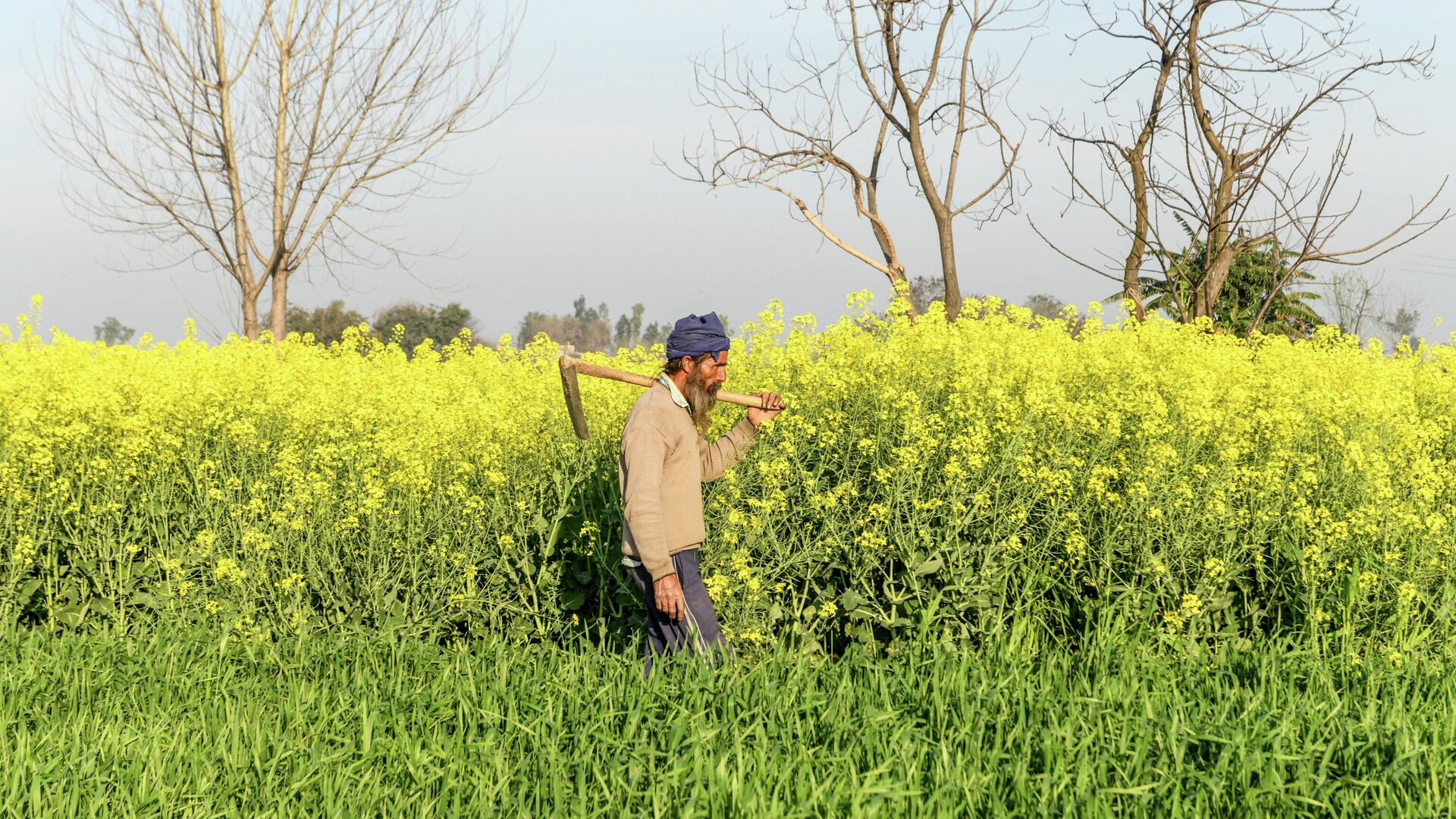https://sputnikglobe.com/20221027/india-approves-commercial-cultivation-of-genetically-modified-mustard-1102752082.html
India Approves Commercial Cultivation of Genetically Modified Mustard
India Approves Commercial Cultivation of Genetically Modified Mustard
Sputnik International
While GM mustard has been approved, commercial use of the seeds will take some years, according to the scientist behind the development of these seeds. Mustard... 27.10.2022, Sputnik International
2022-10-27T08:32+0000
2022-10-27T08:32+0000
2022-11-15T14:22+0000
india
genetically modified
genetically modified food
edibles
oil
commercial use
https://cdn1.img.sputnikglobe.com/img/07e6/0a/1b/1102753254_0:302:3073:2030_1920x0_80_0_0_2635f0ea618d5f159f64a97cd65122e6.jpg
India's biotech regulator --the Genetic Engineering Appraisal Committee (GEAC) under the Federal Ministry of Environment, Forest and Climate Change -- has cleared the commercial cultivation of genetically modified (GM) mustard.The man behind the development of the genetically modified mustard seeds is Deepak Pental, a scientist and a former head of Delhi University. His team spent more than 10 years working on the product.On the other hand, another scientist Bhagirath Choudhary of the non-profit South Asia Biotech Centre said that the government body's decision was in line to resolve India's burgeoning edible oil import bill.India, the largest importer of cooking oil in the world, meets more than 70 percent of its edible oil requirement through imports from nations like Malaysia, Indonesia, Russia, Argentina, Ukraine, and Brazil.Over the years, GM crops have faced stiff resistance from environmental and farmers' bodies, including Rashtriya Swayamsevak Sangh (RSS) affiliates Swadeshi Jagran Manch (SJM) and Bharatiya Kisan Sangh (BKS).In October 2009, India cleared BT brinjal for commercial use but as the move was met with fierce opposition in the country, it was put under moratorium weeks later.
https://sputnikglobe.com/20221013/russia--argentina-emerge-as-indias-major-sunflower-oil-suppliers--1101809990.html
Sputnik International
feedback@sputniknews.com
+74956456601
MIA „Rossiya Segodnya“
2022
Pawan Atri
https://cdn1.img.sputnikglobe.com/img/07e5/05/12/1082926219_0:0:358:358_100x100_80_0_0_aca1d9bdccc7af990e49b4511ee80344.png
Pawan Atri
https://cdn1.img.sputnikglobe.com/img/07e5/05/12/1082926219_0:0:358:358_100x100_80_0_0_aca1d9bdccc7af990e49b4511ee80344.png
News
en_EN
Sputnik International
feedback@sputniknews.com
+74956456601
MIA „Rossiya Segodnya“
Sputnik International
feedback@sputniknews.com
+74956456601
MIA „Rossiya Segodnya“
Pawan Atri
https://cdn1.img.sputnikglobe.com/img/07e5/05/12/1082926219_0:0:358:358_100x100_80_0_0_aca1d9bdccc7af990e49b4511ee80344.png
india, genetically modified, genetically modified food, edibles, oil, commercial use
india, genetically modified, genetically modified food, edibles, oil, commercial use
India Approves Commercial Cultivation of Genetically Modified Mustard
08:32 GMT 27.10.2022 (Updated: 14:22 GMT 15.11.2022) While GM mustard has been approved, commercial use of the seeds will take some years, according to the scientist behind the development of these seeds. Mustard is India's second GM crop after the country adopted genetically modified Bt cotton in 2002.
India's biotech regulator --the Genetic Engineering Appraisal Committee (GEAC) under the Federal Ministry of Environment, Forest and Climate Change -- has cleared the commercial cultivation of genetically modified (GM) mustard.
The man behind the development of the genetically modified mustard seeds is Deepak Pental, a scientist and a former head of Delhi University. His team spent more than 10 years working on the product.
"I can call it a landmark development," Pental said in an interaction with reporters on Wednesday.

13 October 2022, 13:36 GMT
On the other hand, another scientist Bhagirath Choudhary of the non-profit South Asia Biotech Centre said that the government body's decision was in line to resolve India's burgeoning edible oil import bill.
India, the largest importer of cooking oil in the world, meets more than 70 percent of its edible oil requirement through imports from nations like Malaysia, Indonesia, Russia, Argentina, Ukraine, and Brazil.
"The decision of GEAC recognizes the potential of biotechnology to address the issue of India's growing edible oil imports," Choudhary told Reuters.
Over the years, GM crops have
faced stiff resistance from environmental and farmers' bodies, including Rashtriya Swayamsevak Sangh (RSS) affiliates Swadeshi Jagran Manch (SJM) and Bharatiya Kisan Sangh (BKS).
In October 2009, India cleared BT brinjal for commercial use but as the move was met with fierce opposition in the country, it was put under moratorium weeks later.



